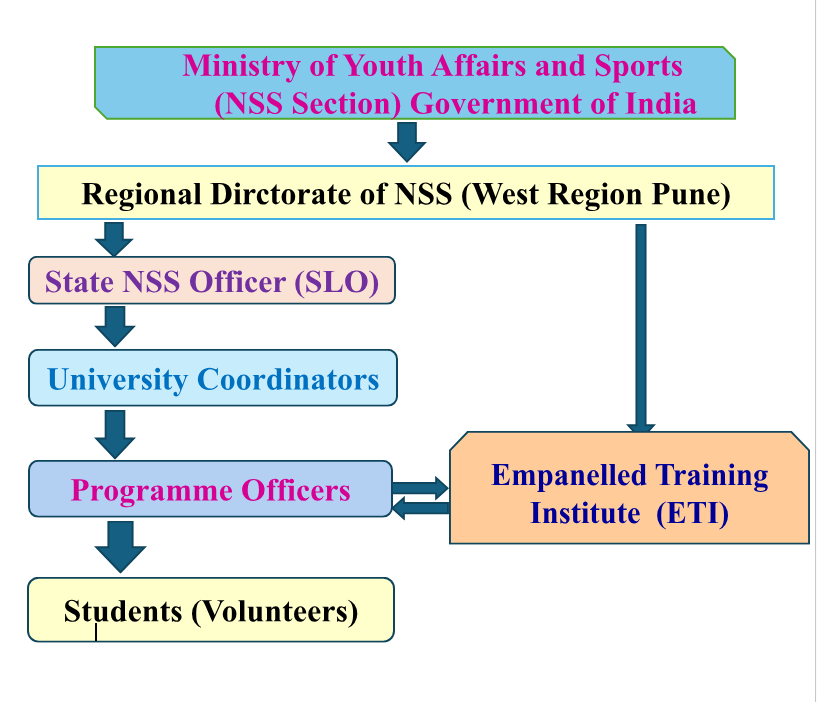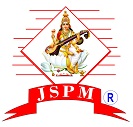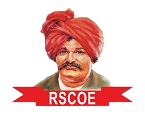NSS Vision, Mission
Vision
To empower students to understand their communities and participate in problem-solving exercises. To develop socially responsible, empathetic, and proactive youth through community engagement and service. To build and develop students’ personalities through voluntary community service.
Mission
- To engage students in constructive social action programs to build their skills and knowledge.
- To foster a sense of social and civic responsibility and leadership qualities in volunteers.
- To develop the capacity to meet emergencies and natural disasters through community involvement.
- To promote national integration and social harmony by linking the campus with the community.
Objectives
The main objectives of National Service Scheme (NSS) are:
- Understand the community in which they work.
- Understand themselves in relation to their community.
- Identify the needs and problems of the community and involve them in problem-solving.
- Develop among themselves a sense of social and civic responsibility.
- Utilise their knowledge in finding practical solutions to individual and community problems.
- Develop competence required for group-living and sharing of responsibilities.
- Gain skills in mobilising community participation.
- Acquire leadership qualities and democratic attitudes.
- Develop capacity to meet emergencies and natural disasters and practise national integration and social harmony.
NSS Pledge
- I, as a responsible volunteer of the National Service Scheme, solemnly pledge to work selflessly and sincerely for the development of our nation and the welfare of society.
- I shall always be ready to help others, uphold the values of social justice, equality, and humanity, and actively participate in every activity.
- I shall utilize my knowledge, efforts, and abilities for the progress of myself, society, and the nation.
- I shall promote and spread the values of environmental conservation, cleanliness, education, health, and social harmony.
- I shall uphold the values enshrined in our Constitution, and the welfare of the nation shall be my highest duty.
- <>Jai Hind!
National Service Scheme Motto
"Not Me But You"
- The motto reminds us of our democratic and social responsibilities.
- It emphasizes the need for selfless service.
- The motto teaches us to consider another person’s perspective and to show empathy towards fellow human beings.
- The welfare of society comes through the welfare of individuals, as society is made up of many individuals.
Organization Structure of NSS

Benefits of Being a Volunteer
An NSS volunteer who takes part in the community service program would either be a college level or a senior secondary level student. Being an active member these student volunteers would have the exposure and experience to be the following:
- An accomplished social leader
- An efficient administrator
- A person who understands human nature
- CERTIFICATE : You get a certificate from NSS saying you have were active and have worked with a couple NGOs.
- INTERNSHIPS : You Will Able To Apply For Government Internships
- CV : Social work on your CV. Most companies prefer to have employees with extra curriculum activities, especially social work. So if you have a certificate in our CV, it will reflect our volunteer ship in NSS.
- AWARDS : NSS volunteers are often recognized and appreciated for their contributions through awards, and appreciation from local communities and authorities.
- GOVT SERVICES : Supplementary marks in Entrance Exam Of various Central Govt and State Govt jobs.
- MS :NSS certificate and the skills you learned in NSS is Helpful for MS
- 1) The main aim of joining the National Service Scheme (NSS) is to promotee social service, community engagement, and the overall development of an individual's personality.
- 2) NSS provide a platform for students to enhance their practical, problem-solving, project management & communication skills, which are valuable for personal and professional growth.
- 3) NSS activities are help students to gain a deeper understanding of societal problems, inequalities and challenges.
Adventure Programs:
OBJECTIVES OF ADVENTURE PROGRAMME
- Promote various adventure activities among NSS volunteers.
- Infuse the sense of love towards the various regions of India.
- Enhance leadership qualities, fraternity, team spirit and risk taking capacity.
- Exposure to new vocational possibilities.
CAMPS
- RDC: National Level Camp
- National Integration Camps
- Adventure Camp
- Joint Camps
- EBSB
- Special Camp
- Regular Camps
- State Level Camp
- Youth Leadership Camp
- Health Camps
- Avahaan: State Level Camp
NSS Team & Portfolios



.png)


















Volunteering Experiences
After joining the NSS I finally got one platform where I can show my leadership qualities, management skills, speaking skills, etc. NSS has significantly boosted my confidence.
In Academic Year 2024-2025, I successfully led and managed three major events: Blood Donation, FY Recruitment, and Women's Day. Handling an entire event is a task of great responsibility, and I was always fortunate to receive the guidance of our NSS Program Officer: Prof. B. B. Gadekar Sir, to fulfill this responsibility.
~ Priyanka Sonanis
I was a shy and nervous person when I joined college, but NSS has played a major role in transforming me into a confident and responsible individual. Through various activities like handling social media accounts, leading as the NSS Lead, and organizing or participating in events such as Blood Donation, Run for Diabetes, River Water Testing, Kirloskar Vasundhara Film Festival, NSS Winter Camp, Shiv Jayanti, and Women’s Day, I developed strong communication, leadership, and management skills.
These experiences not only shaped my personality but also helped me stand out during campus placements, where I successfully cracked company interviews too. I’m deeply thankful to all my NSS teammates, seniors, and juniors for their constant support and brotherhood, and feel truly fortunate to have received the guidance of our NSS Program Officer, Prof. B. B. Gadekar Sir.
~ Suyash Shinde (2021–2025 Batch)
Joining NSS was one of the best decisions of my college life. It gave me the chance to step out of my comfort zone and learn from real experiences. Whether it was organizing events, helping in social activities, or working with the team, every moment taught me something new. NSS helped me become more confident, responsible, and connected to people. I’ll always be grateful for this beautiful journey and the guidance of Prof. B. B. Gadekar Sir.
~ Prathamesh Manmat (2021–2025 Batch)
National Service Scheme (NSS) is a very important part of our college. It helps us build our character and makes us responsible citizens. I joined NSS late, but I worked hard to get in. After a tough interview, I got selected, and it was one of the best decisions I made. NSS has changed me a lot. I learned to lead a team and make decisions. I understood the importance of working together with others. Seeing societal problems up close made me think about solutions and take action. I made new connections and gained confidence.
The journey was very helpful and unforgettable. I think NSS is playing a big role in shaping us into responsible citizens. It's not just a unit; it's our family.
~ Ravindra Sonune
My NSS Journey:
When I first joined college, I was an introverted person who didn’t like to talk much with others. But joining the National Service Scheme (NSS) completely changed that part of me. Even though I joined a little late, I worked hard to earn my place. NSS provided me a stage to express myself and overcome hesitation. It became more than just an organization — it became my family.
Here, I developed important skills like event management, leadership, teamwork, and communication. At every stage of this journey, Prof. B. B. Gadekar Sir guided me like a father — motivating, supporting, and shaping me into a better version of myself.
NSS has transformed me from a quiet observer into an active, confident, and responsible individual. Truly, NSS is not just a unit — it’s a family that changed my life.
~ Nirmitee
“Serving as the President of NSS for the academic year 2024–2025 has been one of the most beautiful experiences of my life. NSS was never just an organization to me — it felt like a family. From orphanage visits to celebrating Shivjayanti, every event reflected our unity and spirit.
NSS also gave me a stage to express my love for acting through street plays. Leading the NSS Winter Camp was the most precious part of my journey — thanks to Gadekar Sir for this opportunity. NSS taught me that when you serve with heart, you gain not just experiences — you gain a family for life.”
~ Akshata Kajale
I joined NSS knowing only its motto “Not Me, But You.” The “Run for Unity” event inspired me deeply. Later, the Winter Camp became one of the best experiences of my life — teamwork, laughter, and real learning. Prof. B. B. Gadekar Sir guided us throughout this beautiful journey. I am proud to be an NSS member.
~ Manthan Deore
When I first joined the National Service Scheme, I never imagined it would become such an important part of my college life. As a Department Coordinator, I had the opportunity to lead, organize, and participate in various activities like cleanliness drives, tree plantations, and blood donation camps. NSS became a family where I learned the true meaning of “Not Me, But You.”
~ Harshita Daftari
The first interview I gave in college was for NSS. It taught me joy, responsibility, and leadership. I served as ‘President,’ which helped me grow immensely. I learned to speak confidently in front of any audience, and for that, I’m forever grateful to the NSS family and Prof. B. B. Gadekar Sir.
~ Harshwardhan Sunil Kajale
Being part of the NSS was one of the most inspiring experiences of college life. From orphanage visits to national events and the NSS camp, every moment taught compassion and teamwork. With the guidance of Prof. B. B. Gadekar Sir, we learned leadership, service, and unity.
~ Yash Katkar
The NSS at our college has been a platform for unity and service. From drives to awareness campaigns, every activity reflected teamwork and compassion. The annual NSS camp was enriching and unforgettable. Prof. B. B. Gadekar Sir’s guidance made all the difference in shaping us as leaders and responsible citizens.
~ Srushti Wani
When hard work and spirit meet opportunity, wonders are made. NSS became our heartbeat — shaping us into changemakers. From service to awareness, from early mornings to sleepless nights, NSS gave meaning to our efforts. Special thanks to Prof. B. B. Gadekar Sir — our guiding light and mentor.
~ Harshvardhan Gaikwad (HR)
Joining NSS was a valuable part of my college life. From winter camps to awareness activities, every moment helped me grow as a leader. I’ll never forget the time when Gadekar Sir showed faith in me during a difficult moment — it taught me true leadership and forgiveness. NSS made me stronger and more compassionate.
~ Anonymous Volunteer
Being the Civil Department Coordinator in NSS has been one of the most memorable parts of my college life. Leading the Shivjayanti event taught me real teamwork and leadership. NSS gave me not just experiences but also a family. Special thanks to Prof. B. B. Gadekar Sir for his guidance and motivation.
~ Swapnil Savant (Civil Dept. Coordinator)
Videos and Reels
Women’s Day 2025
Shivjayanti Reel 2025
Session of Awareness on Drugs, Alcohol & Tobacco Abuse
Science Day 2024
Celebrating NSS Day
NSS History
Concept and Beginning of National Service Scheme

History of the National Service Scheme (NSS)
- The concept of launching the National Service Scheme (NSS) originated from the ideas of Mahatma Gandhi and Jawaharlal Nehru.
- In January 1950, Dr. S. Radhakrishnan, the Chairman of the University Education Commission, organized a meeting to discuss how to implement the “ideal” education model inspired by the Gandhian era.
- In 1952, during the First Five-Year Plan, a proposal was made to organize student camps emphasizing social service and physical labor.
- In 1958, Jawaharlal Nehru suggested that a scheme should be designed for college and university students to engage in rural community service for a period of nine months to one year after completing their degree education.

Development of NSS Committee (1959–1969)
- In 1959, during a meeting of Education Ministers held in Delhi, a committee was established under the chairmanship of Dr. C. D. Deshmukh to prepare such a scheme.
- In 1960, Prof. K. G. Saiyidain studied various countries and submitted a report titled “National Service for the Youth.”
- In 1964, Dr. D. S. Kothari, Chairman of the Education Commission of India, recommended in his report that students should participate in organized social service programs and suggested ways such schemes could be implemented.
- In May 1969, a meeting of the Vice-Chancellors’ Subcommittee was held, during which a draft of the National Service Scheme (NSS) was prepared.

NSS Badge
In the center of the badge, there is a wheel with eight spokes. These spokes represent the 24 hours of the day (the Ashta Prahar, meaning 24 hours). The person who wears this badge is reminded that they are ready to serve the nation day and night, 24 hours a day. The red color symbolizes the passionate and energetic blood of youth. The blue color represents the sky — vast and limitless — symbolizing the broad and selfless spirit of the National Service Scheme (NSS). Wearing this badge signifies that the volunteer is willing to dedicate some of their time for the welfare of humanity.
NSS Activity Reports
NSS Activity Calendar
NSS Gallery








